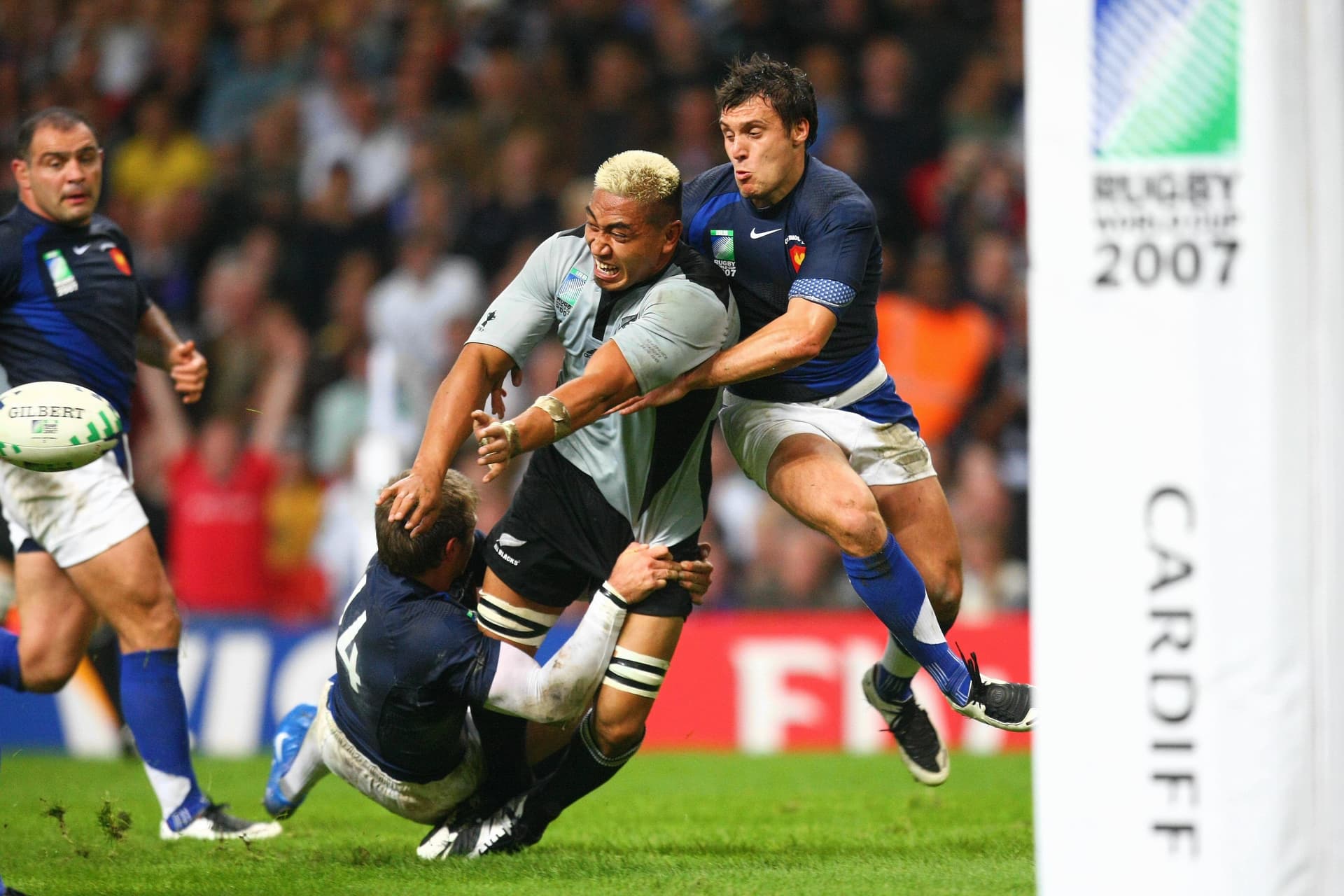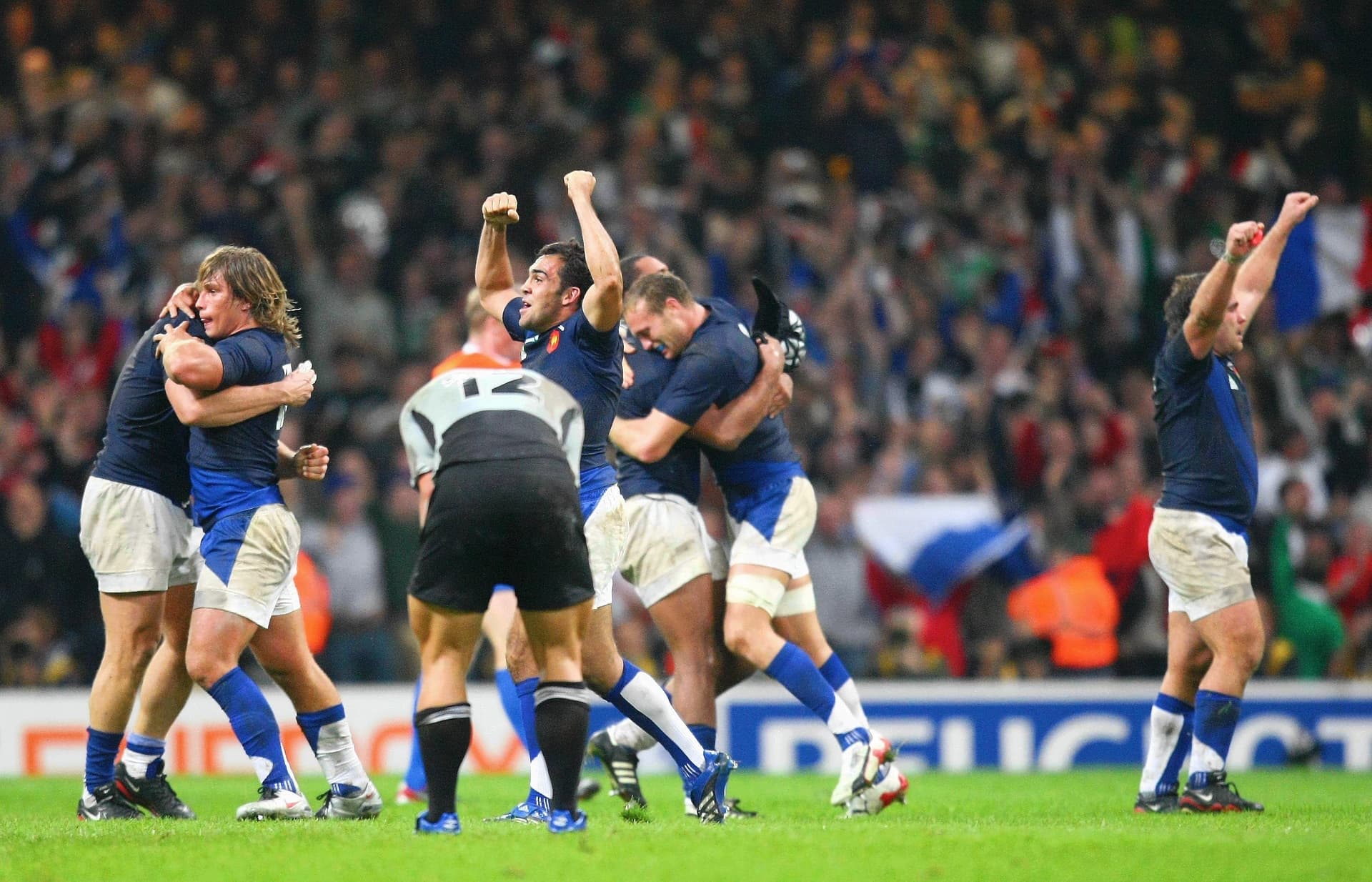Rugby
What is a Forward Pass in Rugby?
Rugby Union has many strange rules for a ball sport, which is why the sport split from Association Football in 1863. What is a forward pass in rugby? Find out here!

Image Credits: liewig christian/Corbis via Getty Images
Rugby Union is one of the few sports where players can only pass backwards to move forwards. This is true of all codes of rugby football, including Rugby League, Sevens Rugby, Rugby 10s, Beach Rugby, and Touch Rugby. SportsBoom looked at the intricacies of the passing rules to find out what a forward pass is in rugby union.
Definition of the Forward Pass in Rugby Union
World Rugby (WR) is the governing body of rugby union. Law 11.7, on World Rugby’s official website states: “A player must not intentionally throw or pass the ball forward.” A forward pass is illegal in rugby. It is one of the many reasons for the split in association football in 1863 and the formation of the Rugby Football Union (RFU).
If a pass goes forward, a scrum is awarded to the opposing team. However, on the rare occasion, the referee deems a pass to be intentionally passed forward, a penalty will be awarded to the opposition team. WR adds that the definition of a forward pass is a pass to a team-mate “towards the opposition’s dead-ball line.”
In other forms of rugby football, different restarts come from a forward pass. In rugby league, sevens, and ten-man rugby, a scrum is awarded to the opposition following a forward pass. In beach and touch rugby, a forward pass results in a free-kick and a tap-and-go from the point of the indiscretion.
The Most Controversial Forward Passes in Rugby History
Rugby union is no different from any other sport, especially when it comes to controversy surrounding interpretation of the laws or officiating mistakes. Rugby has highly subjective laws. The laws are open to interpretation depending on the officials. Many professional teams work with retired referees. The data analysis teams put together dossiers and highlight reels of the referees, who will take charge of upcoming games.
The most controversial forward pass in modern-day rugby happened during the 2007 Rugby World Cup (RWC). Co-hosts France drew New Zealand in the quarter-final at the Millenium Stadium in Cardiff, Wales. Rugby World Cup matches between the two often decide the winners of the tournament.

Image Credits: liewig christian/Corbis via Getty Images
The All Blacks, inspired by one of their greatest wingers and captains, John Kirwin, thrashed France 29-9 in the 1987 RWC final in New Zealand. Tries were still worth four points until 1991. The French gained revenge against the Kiwis in the 1999 RWC semi-final in England. France fought back from 24-10 down (five minutes after halftime) to beat New Zealand 43-31 in one of the greatest rugby matches in history.
The 1999 semi-final at Twickenham was regarded as the best World Cup match ever until South Africa defeated France 29-28 at the Stade de France in the 2023 RWC quarter-final in Paris. The game has entered rugby folklore as one of the greatest matches.
2007 Rugby World Cup Quarter-final, Millenium Stadium, Cardiff, Wales: New Zealand 18 – 20 France
New Zealand went into the 2007 Rugby World Cup tournament as heavy favourites to lift the William Webb Ellis Trophy. They cruised through their group to advance to the knock-out stages unbeaten. They scored an average of 77 points per game, scoring the most tries as they crushed all-comers. It had been 20 years since the All Blacks won the inaugural tournament on home soil. The pressure from the Kiwis’ supporters back home was immense.
The All Blacks had thrashed France by a combined 103 points to 21 in a two-Test match series four months before the tournament. The 2007 quarter-final lives long in infamy. The game began with France confronting the Kiwis by walking up to them while they performed the Haka.

Image Credits: Ross Land/Getty Images
This spurred on the All Blacks. As with the 1999 semi-final, New Zealand took a two-score double-digit lead into the break after a Luke McAlister try and Dan Carter’s boot. France fought back to level the scores in the third quarter. Lionel Beauxis added a second penalty before he converted Thierry Dusautoir’s try to make it 13-all after 55 minutes.
Rodney So'oialo hit back for the Kiwis just after the hour mark. Carter missed what proved to be the winning conversion, but New Zealand led by five points. The game continued to be tight. However, with eleven minutes remaining, France scored a controversial try following a forward pass. Referee Wayne Barnes, who would be no stranger to controversially officiated Test matches throughout his career, made a monumental error.
France fullback Damien Traille made a break near midfield. As he got tackled, he popped a forward pass to Frédéric Michalak, who burst through the hole and raced into the opposition’s 22. The substitute flyhalf swivelled and offloaded to the supporting Yannick Jauzion, who cut inside to score from ten metres out. Jean-Baptiste Élissalde converted to edge France ahead. New Zealand had opportunities to win but missed a late drop goal attempt with 50 seconds to play. The fallout was intense.
Forward Pass Fallout
The Fallout Following the Controversial Quarter-final was fierce. New Zealand’s media and fans bayed for blood. The intense criticism of Barnes went to new levels of absurdity. All blacks coach Graham Henry, even insinuated in his autobiography that the officials deliberately impeded New Zealand by not awarding penalties.
Star winger Doug Howlett was arrested for jumping on cars at Heathrow airport, and Carter stated that the All Blacks were not mentally prepared for the pressure France put on them. The media labelled Henry’s team “arrogant” and “chokers” after the defeat. The All Blacks had their revenge four years later.
The 2011 RWC final at Eden Park in Auckland was marred by questionable refereeing. The dull final, which saw New Zealand beat France 8-7 was labelled the “most controversial” match of all time. Craig Joubert had a poor game. Four years later, the South African ref would go on to make one of the worst errors in World Cup history, but that is for another day. It is safe to say that RWC games between New Zealand and France always have spice.

Kaylan Geekie is a sports fanatic. He attended Durban High School before moving to Scotland, where he lived for 15 years. During his time in the United Kingdom, Kaylan graduated with a first-class BA Honours Degree in Sports Journalism at the University of the West of Scotland. Kaylan worked for nine years as the Match-Day Editor of SuperXV.com, reporting on Super Rugby, The Rugby Championship, the 2015 Men's Rugby World Cup and the 2017 British & Irish Lions series for the website.